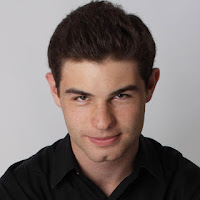Drew Petersen launches his residency at University of Indianapolis with a recital
 |
| Drew Petersen played an all-American recital. |
And that was just one of the ways in which Drew Petersen made his mark on his way to winning the 2017 contest. Despite my reluctance to choose favorites while a competition is in progress, Petersen had won me over last January with his revelatory performance of Robert Schumann's problematic "Humoreske."
The announcement of the Christel DeHaan Fellowship win brought news of an additional honor for the APA winner. On Monday night, Petersen launched a two-year residency at the University of Indianapolis with a solo recital in the Lilly Performance Hall of the DeHaan Fine Arts Center. The arrangement will bring him to the Southside campus for one week each semester through the 2018-19 school year for lectures, lessons, master classes, and performances.
Monday's all-American program opened with "Attars," which quickly confirmed the richness and depth of his playing. The five movements of this dappled evocation of essential oils test a pianist's skill at imparting pastel colors to an instrument inherently percussive. Petersen displayed the knack; Zaimont's score aspires to a synesthetic blend of olfactory and auditory impressions. The bluesy quality and the relaxed pulse given to "Musk," the second of the attars represented, was especially inviting.
Something in "Pink Lotus," a hymnlike quality, foreshadowed much of the atmosphere of "The Alcotts," a movement from Charles Ives' embrace of New England's transcendentalist heritage, Sonata No. 2 ("Concord, Mass., 1840-60"). Petersen displayed his skill at layering sonorities, so that some of Ives' brief quotations and paraphrases of 19th-century parlor piano had a veiled quality. It was as if they were summoned up through the scrim of fading memories. The signature motif of Beethoven's Fifth recurs, less "fate knocking at the door" than fate closing the door softly behind it.
American impressionism from a less magpie sensibility ended the recital with the short-lived Charles Thomlinson Griffes' Fantasy Pieces, op. 6. The "Barcarolle" rocked back and forth with a tenderness as pungent as a gondolier's song. The central piece, "Notturno," the most deeply impressionistic of the three miniatures, featured a hushed ending that took the breath away. "Scherzo," the finale, was most thickly scored, yet its galloping rhythm remained firmly etched.
Two encores from Gershwin were offered, starting with Earl Wild's sugary etude transcription of "The Man I Love," its romantic haze quickly counteracted by a brisk, agreeably insouciant performance of a Prelude.
The substantial center of the program, divided sensibly by an intermission, consisted of Samuel Barber's Piano Sonata, op. 26, and Elliott Carter's Sonata (1945-46). The Barber benefited from a rare endorsement by Vladimir Horowitz, which helped underpin the composer's claim to a solid place in the repertoire apart from the modernist mainstream. Not that his sonata ignores the bracing dissonance and formal complexity that people generally associate with 20th-century music; there is a torrent of competing voices in the Allegro energico first movement, characteristically brought to clarity by Petersen.
The Tchaikovskyan spirit of the second movement was put through a modern American filter, with blues and Great American Songbook touches evident in its toccata-like sweep. Petersen's patient elucidation of the slow movement, Adagio mesto, was exemplary, with another Romantic carryover — apt rubato discrepancies between the right and left hands.
Something mischievous in me almost wishes the Barber sonata ended there, that it could be contemplated as a magnificent torso, a Winged Victory for our times.
But Barber, inheriting the 19th-century habit of putting the most virtuosic and expressive weight on final movements, chose to end with a fugue. The form is fine in its place, but its place doesn't strike me as right for the mid-20th century. However, the choice is fully within Barber's retrospective manner, and, to be sure, he knew how to play the master craftsman. Each time the subject came up, Petersen pointed the way brightly. The theme's rhythmic profile was always precise and snappy. The stretto marshaled a final rush of energy, with a big crescendo toward the end. Yes, we are properly wowed, Samuel.
Though there's much of Elliott Carter's music I can't claim to understand, his pursuit of an individual path just a few years before Barber wrote his sonata is much more attractive to me. His Sonata is a worthy monument, worth repeated hearings, in a career that always prized innovation, but without gimmickry or outre stuff on, around or near the keyboard. Petersen's performance gave plenty of room to the spacious layout of the first movement in particular; he was attentive to the interplay between sustained notes' resonance and freshly struck notes.
The second movement shows that Carter had not shed his "Americanist" sensibility entirely. The open spaces of Aaron Copland are suggested, and the younger composer had not set aside repetition as firmly as he was about to in the Cello Sonata or, especially, in the groundbreaking First String Quartet.
Nonetheless, the listener to the Sonata is unlikely to feel that Carter is much interested in looking backward, because he bends every reminder of what he previously did, or what his colleagues were up to, toward new ends — new ways of making music's chief solo instrument speak and avoidance of its well-worn pathways of eloquence. The work ends not with spectacle, but on an even rhetorical plateau. Away with inherited devices, formulas, structures! I took pleasure from Petersen's way with both Barber and Carter, but the latter piece was (and remains) a lot closer to my heart.



Comments
Post a Comment